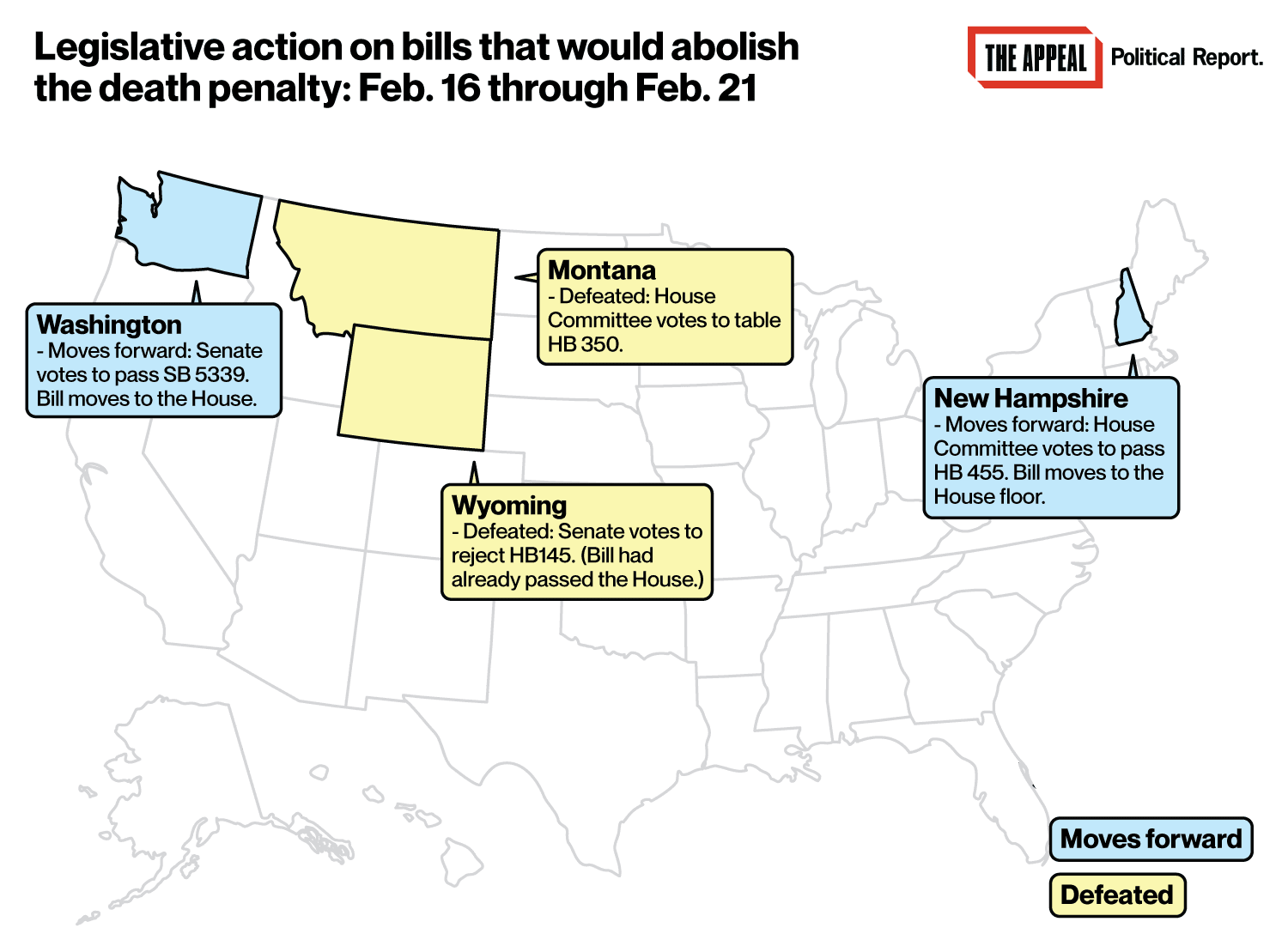Bill to Abolish the Death Penalty Fails in Wyoming
Daniel Nichanian | February 21, 2019
This article originally appeared on The Appeal, which hosted The Political Report project.
The Wyoming Senate votes down abolition weeks after it cleared the House, but repeal bills advance in Washington & New Hampshire
The Wyoming Senate on a 18-12 vote rejected legislation that would have abolished the death penalty. The bill, which was sponsored by Republican lawmakers Jared Olsen and Brian Boner, had cleared the state House two weeks before. That alone was a significant step because the lower chamber had rejected similar legislation in each of the previous four years.
Proponents of abolition had argued that retaining the death penalty is too costly given the legal defense fund that the state maintains, even if there is no one on its death row. They also pointed to the potential for error. “It is impossible to impose the death penalty without mistakes, and the American criminal justice system provides no reliable safeguards against the execution of innocent people,” three men who were on death row before being exonerated wrote in an op-ed published Feb. 14 in the Wyoming Tribune Eagle. “Remember, there’s no reversing a wrongful execution.”
The Senate’s only three Democrats voted in favor of repeal, as did nine Republicans. Eighteen Republicans voted to keep the death penalty. One of the latter, Lynn Hutchings, offered a theological explanation. “The greatest man who ever lived died via the death penalty for you and me,” she said. “If it wasn’t for Jesus dying via the death penalty, we would all have no hope.” Others who opposed abolition defended the death penalty’s utility as a tool prosecutors can invoke when dealing with defendants.
Matt Redle, a former prosecutor, testified against abolition on behalf of the Wyoming County & Prosecuting Attorneys Association, a group that represents the state’s prosecutors. Redle told a Senate committee that 18 of the state’s 23 elected prosecutors were against repeal, while one backed it. I asked Redle which prosecutors held which position, and who were the four prosecutors who held neither position. He explained that he had reached out via email to those whose contact information he had, and that he had told them he would keep their individual stances confidential, in part to “encourage the maximum degree of honesty possible.”
The repeal bill was primarily championed by a coalition made up of the ACLU of Wyoming, the Catholic Diocese of Cheyenne, and the League of Women Voters of Wyoming. Susan Simpson, the league’s president, told me that success would require forming a broader coalition, and specifically getting the support of more religious denominations. “We need Episcopalians and LDS (The Church of Jesus Christ of Latter-day Saints) to the extent possible,” she wrote in an email.
Marguerite Herman, the group’s lobbyist, added that progress relative to past years will help in the years ahead. “The effort started small and local and grew as we gained publicity through the session,” she wrote in another email, pointing to the involvement of new actors such as Witness to Innocence, a national organization. “Awareness and apparent chance of actually succeeding will be useful in building support for future efforts.”
Legislation to abolish the death penalty also failed Wednesday, though at a much earlier stage of the process, in the Montana House Judiciary Committee.
However, two states moved forward on death penalty abolition over the past week.
In Washington, the Senate voted Friday to abolish the death penalty. The legislation now moves to the House. Washington’s Supreme Court already struck down the death penalty in October. The court pointed to a study documenting stark racial disparities in its application to rule that it was applied in an “arbitrary and racially biased manner.” This ruling left the door ajar for a legislative fix. SB 5339 looks to shut that door.
In New Hampshire, a House committee voted Wednesday in favor of an abolition bill. The bill now moves to the House floor. As I reported in November, the state’s 2018 elections gave abolition a veto-proof majority in the Senate and a likely one in the House.
Legislators have introduced bills to abolish the death penalty in other states, though they have yet to be voted on.



